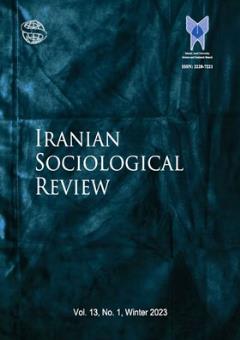Sociological Analysis of the Rule of Law in the Islamic Republic of Iran
Subject Areas : Iranian Sociological Review
Garineh Keshishyan Siraki
1
![]() ,
Shahram Ghazizadeh
2
,
Shahram Ghazizadeh
2
![]()
1 - Associate Professor of Islamic Azad University
2 - وزارت امور خارجه ایران- سفارت ایران در هلند
Keywords: The rule of law, Constitution, Divine law, the Islamic Republic of Iran, the rule of people,
Abstract :
Sociological Analysis of the Rule of Law In the Islamic Republic of Iran Depending on which of the three sources of "collective representation," "divine law," and "rule of the people" is the origin of law, there are multiple perceptions, rights, and duties for the people and states. In the I.R of Iran, the law is nourishing by two sources: "infrastructural origin of divine law" and "superstructural origin of the rule of people." The I.R. of Iran's unique structure that puts the two axes of "Islamism" as divine law and "Republicanism" as a modern law together causes widespread paradoxes. In formulating rules and laws, the Iranian legislature, seeks to establish social and communicative laws for the Iranian semi-traditional semi-modern society, leading society to confusion. These contradictions have intensified in recent years, with the strengthening and expansion of cyberspace and social networks. Therefore, mutual interaction based on communicative rationality in the I.R. of Iran is still in its infancy.
- Abrahamian, Yervand, (2011), History of Modern Iran, translated by Mohammad Ebrahim Fattahi, Tehran, Ney Publications
- Aslani, Firooz, and Kazemini, Seyed Mohammad Hossein, (2011), "The concept of the rule of law and its interpretation with emphasis on the Constitution of the Islamic Republic of Iran," Journal of Islamic Revolution Studies, Vol. 26
- Bashiriyeh, Hossein, (1987), "Basic of Religious Sociology," Journal of the Faculty of Law and Political Science, Vol. 23
- Darvish, Mohammad Reza, (2003), "Religious Democracy or Religious People’s Democracy," Baztab e Andisheh Monthly, Vol. 37
- Durkheim, Emil, (1990), About social division of labor, translated by Mohammad Baqer Parham, Tehran, Markaz Publications
- Ghazi Shariat Panahi, Abolfazl, (2016), Essentials of Constitutional Law, Tehran, Mizan Publications
- Gozzi, Gustavo, (2007), Rechtsstaat and Individual Rights in German Constitutional History, in The Rule of Law (History, Theory, and Criticism), Edited by Pietro Costa, New York, Springer Publication
- Hajipour, Nusratullah, (2004), Implementation of Laws with Sharia in the Iranian Legislative System, First Edition, Tehran, Islamic Revolutionary Documentation Center Publication
- Hashemi, Seyed Mohammad, (2004), "Constitution and People's Sovereignty," Periodical Journal of Constitutional Rights, No. 3
- Kadivar, Mohsen, (1997), Theories of Government in Shiite Jurisprudence, Political Thought in Islam (1), Tehran, Nashr e Ney Publications
- Katouzian, Homayoun, (1979), "Nationalist trends in Iran, Publisher," International Journal of Middle East Studies, No. 4, Vol. 10
- Khomeini, Ruhollah, (1999), Sahifa Imam, Tehran, Institute for Organizing and Publishing the Works of Imam Khomeini
- Markaz Malmiri, Ahmad, (2006), Rule of Law; Concepts and Perceptions, First Edition, Tehran, Research Center of the Islamic Consultative Assembly
- Mirahmadi, Mansour, (2009), Theory of Religious Democracy, Concept, Principles, and Model of Political System, Tehran, Shahid Beheshti University Publications
- Mirmousavi, Seyed Ali, (2005), Islam, Tradition, Modern Government, Modernization and Transformation in Contemporary Shiite Political Thought, First Edition, Tehran, Nashr e Ney Publications
- Mohajer, Mohsen, (2009), "Civil Society and the Islamic Republic of Iran," Periodical Journal of Ketab e Naghd, Year 3, No. 9
- Naini, Mohammad Hossein, (2009), Tanbih al-Ummah and Tanzih al-Mellah, edited by Seyed Javad Varai, Tehran, Bustan e Ketab e Qom Publications
- Shahram Nia, Amir Masoud, (2007), Globalization and Democracy in Iran, Tehran, Negah e Moaser Publications
- Zarei, Masoud and Faramarz, Atrian, (2012), "Rule of Law and Supreme Leader's Rulings in the Constitution of the Islamic Republic of Iran," Periodical Journal of Islamic Government, No. 1(63), Vol. 17


